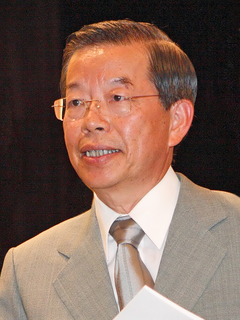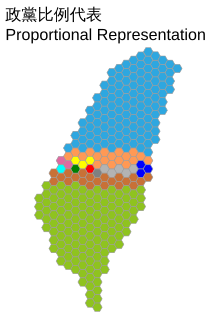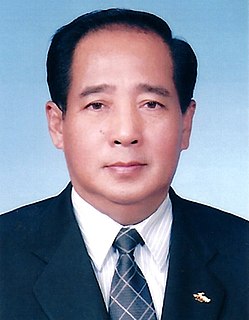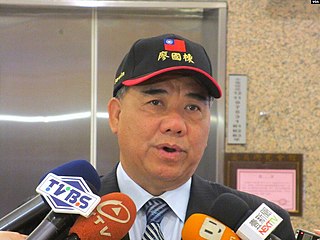Single non-transferable vote or SNTV is an electoral system used in multi-member constituency elections. It is a generalization of First-Past-The-Post, applied to multi-member constituencies.
The pan-Blue coalition, pan-Blue force or pan-Blue groups is a loose political coalition in Taiwan, consisting of the Kuomintang (KMT), the People First Party (PFP), New Party (CNP) and Non-Partisan Solidarity Union (NPSU). The name comes from the party colours of the Kuomintang. This coalition tends to favor a Chinese nationalist identity over a separate Taiwanese one and favors a softer policy and greater economic linkage with the People's Republic of China, as opposed to the Pan-Green Coalition.

Green Party Taiwan is a political party in Taiwan established on 25 January 1996. Although the party is sympathetic to Taiwan nationalism and shares a number of centre-left positions with the Pan-Green Coalition, the party emphasizes campaigning primarily on social and environmental issues. The party is not a member of, and should not be confused with, the Pan-Green Coalition. Green Party Taiwan is a member of the Asia Pacific Greens Federation and participates in the Global Greens.

The Legislative Yuan is the unicameral legislature of the Republic of China now based in Taiwan. It is one of the five branches of government stipulated by the Constitution of the Republic of China, which follows Sun Yat-sen's Three Principles of the People.
The Webster/Sainte-Laguë method, often simply Webster method or Sainte-Laguë method, is a highest quotient method for allocating seats in party-list proportional representation used in many voting systems. It is named in Europe after the French mathematician André Sainte-Laguë and in United States after statesman and senator Daniel Webster. The method is quite similar to the D'Hondt method, but uses different divisors. In most cases the largest remainder method delivers almost identical results. The D'Hondt method gives similar results too, but favors larger parties compared to the Webster/Sainte-Laguë method. Often there is an electoral threshold, that is a minimum percentage of votes required to be allocated seats.

The 2004 Taiwanese legislative election was held on 11 December 2004. All 225 seats of the Legislative Yuan were up for election: 168 elected by popular vote, 41 elected on the basis of the proportion of nationwide votes received by participating political parties, eight elected from overseas Chinese constituencies on the basis of the proportion of nationwide votes received by participating political parties, eight elected by popular vote among the aboriginal populations. Members served three-year terms beginning on 1 February 2005, and ending 31 January 2008. The next term served four years.

There are eleven types of elections in Taiwan which, since 2012, have been unified into general and local elections, each held every four years, typically in January and November respectively. There may also be by-elections. Electoral systems include first-past-the-post, proportional representation, single non-transferable voting, and a parallel mixture of the above.

The 2001 Taiwanese legislative election was held on 1 December 2001. All 225 seats of the Legislative Yuan were up for election: 168 elected by popular vote, 41 elected on the basis of the proportion of nationwide votes received by participating political parties, eight elected from overseas Chinese constituencies on the basis of the proportion of nationwide votes received by participating political parties, eight elected by popular vote among the Taiwanese aboriginal populations. Members served three year terms from February 1, 2002 to February 1, 2005.

An election for the National Assembly took place in Taiwan on Saturday 14 May 2005, from 07:30 to 16:00 local time. It elected an ad hoc National Assembly whose only function was to serve as a constitutional convention in order to approve or reject amendments to the Constitution of the Republic of China already proposed by the Legislative Yuan. The results indicated that the amendments would be approved, as the parties supporting them won an overwhelming majority, and indeed the amendments were passed on June 7, 2005. The election was carried out using purely the party-list proportional representation system. The official campaign period was 07:00 to 22:00 each day from 4 May 2005 to 13 May 2005. Official election broadcasts by the ad hoc coalitions and (established) parties were provided by the Public Television Service Taiwan on 7 May 2005; several unofficial debates were also arranged. Notably, this election saw the temporary breakdown of the traditional two-coalition system in Taiwanese politics: instead of dividing into the Pan-Green Coalition and Pan-Blue Coalition over the political status of Taiwan, the parties divided themselves into larger and smaller parties, with the larger Democratic Progressive Party and Kuomintang in support of the amendments and the smaller People First Party and Taiwan Solidarity Union against them.

The 2008 Taiwanese legislative election was held on 16 January 2012 for members of the Legislative Yuan. It was the first Legislative Yuan election after the constitutional amendments of 2005, which extended term length from three to four years, reduced seat count from 225 to 113, and introduced the current electoral system.

The 2012 Taiwanese legislative election was held on 16 January 2012 for all 113 seats in the Legislative Yuan. For the first time, legislative elections were held simultaneously with the presidential election. Elected parliamentarians formed the fifteenth Legislative Yuan session since 1946, when the current constitution came into effect.

Lee Chin-yung is a Taiwanese politician. He was a member of the Legislative Yuan from 1993 to 1997, when he was elected Mayor of Keelung. Lee remained mayor until 2001. He served as acting Yunlin County magistrate in 2005, and was later served a full term in the office between 2014 and 2018. Following an unsuccessful bid for reelection as Yunlin County magistrate, Lee was appointed chairperson of the Central Election Commission in 2019.

The 2016 Taiwanese legislative election was held, along with the presidential election, on 16 January 2016 for all 113 seats in the Legislative Yuan. The Democratic Progressive Party (DPP) led by Tsai Ing-wen, who also won the presidential election on the same day, secured a majority for the first time in history by winning 68 seats. The ruling Kuomintang (KMT) lost both the presidency and its legislative majority and returned to the opposition.
The Lowland Aborigine constituency is a multi-member constituency of the Legislative Yuan. Taiwanese indigenous people have elected representatives to reserved legislative seats since the 1970s. Predecessors to both the Lowland and Highland Aborigine districts were established in 1994. Since 2008 the Lowland Taiwanese indigenous elect three members to the Legislative Yuan.
The Highland Aborigine constituency is a multi-member constituency of the Legislative Yuan. Taiwanese indigenous people have elected representatives to reserved legislative seats since the 1970s. Predecessors to both the Highland and Lowland Aborigine districts were established in 1994. Since 2008, the Highland Taiwanese indigenous elect three members to the Legislative Yuan.

Chien Tung-ming is a Taiwanese Paiwan politician. Also known by the Paiwan-language name Uliw Qaljupayare, he represented the Highland Aborigine district from 2008 to 2020, alongside Kao Chin Su-mei and Kung Wen-chi.

Walis Perin is a Seediq Taiwanese politician. He served four terms in the Legislative Yuan from 1993 to 2005, each time with a different political affiliation. He became a founding member of the Non-Partisan Solidarity Union in 2004, and after losing reelection, was appointed the minister for the Council of Indigenous Peoples in 2005. He stepped down in 2007, and since then has launched two unsuccessful legislative campaigns, in 2012 with the People First Party and 2016, representing the Democratic Progressive Party. In 2018, Walis Perin was appointed to the Control Yuan.

Liao Kuo-tung is a Taiwanese aboriginal politician. Also known by the Amis name Sufin Siluko, he has represented the Lowland Aborigine Constituency in the Legislative Yuan since 2002.

The 2020 Taiwanese legislative election was held on 11 January 2020 for all 113 seats to the Legislative Yuan concurrently with the 15th presidential election in Taiwan. The term of the Legislative Yuan will begin on 1 February 2020.
The Legislative Yuan is the unicameral legislature of Taiwan, currently with 113 seats. 73 are directly elected in local single-member districts.













